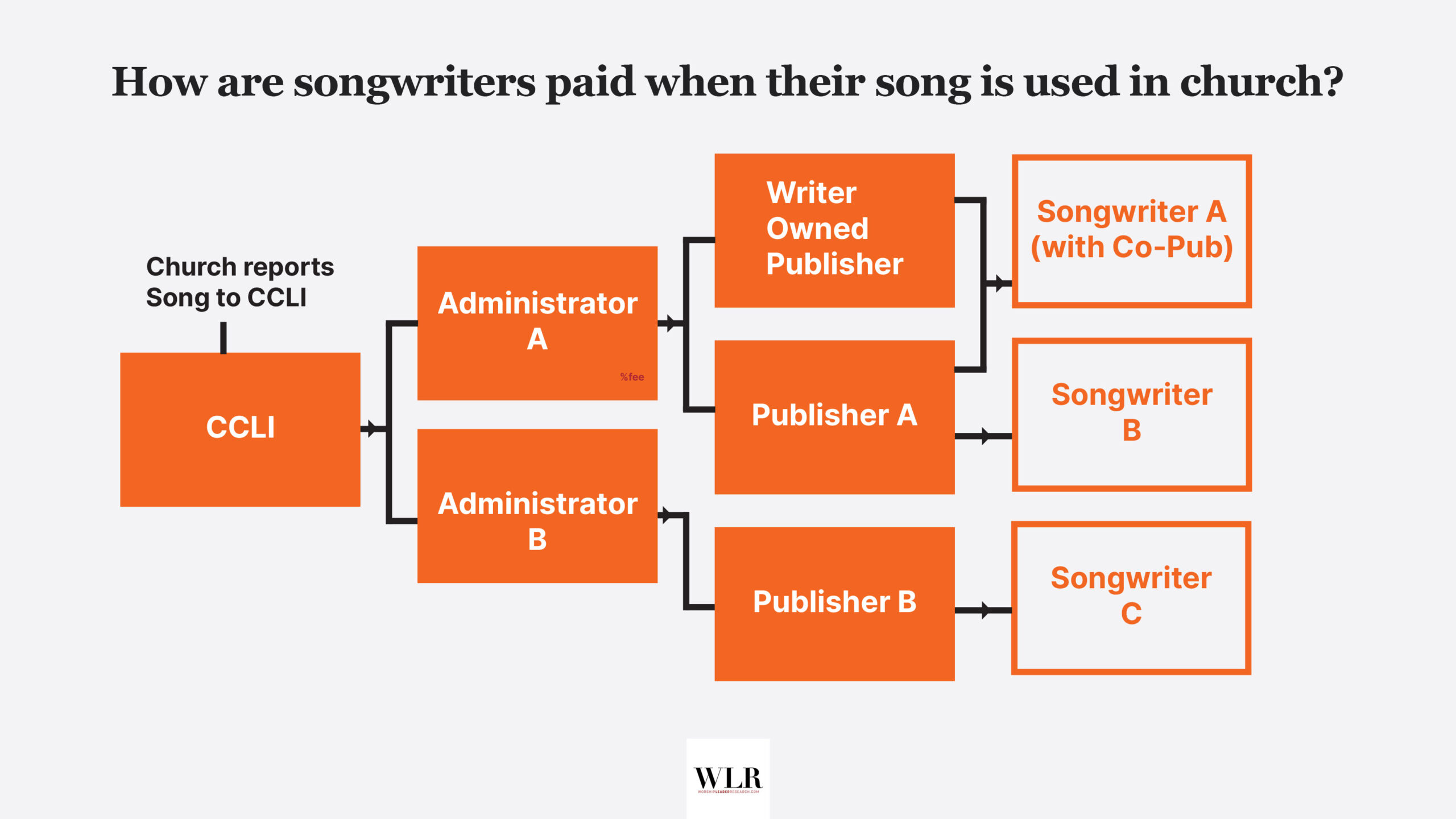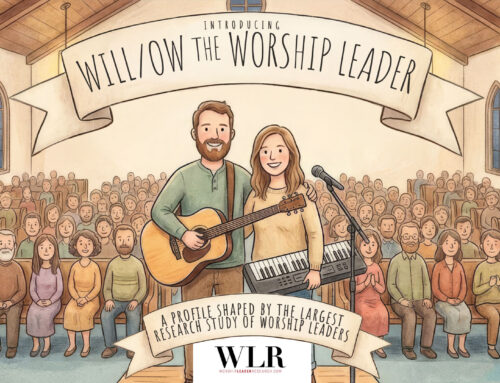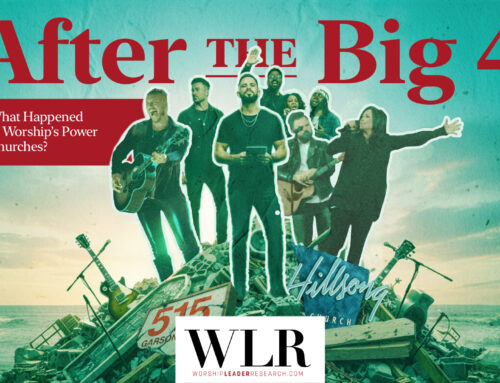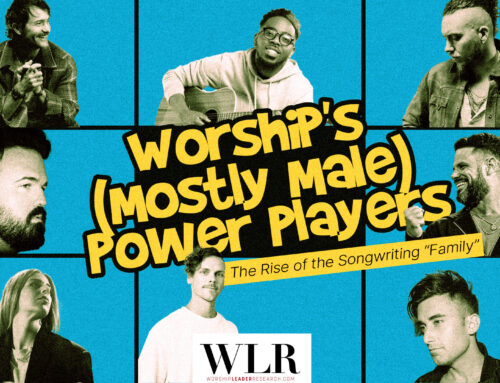Following the Worship Money: Publishers and Administrators
Explore a series of interactive visualizations highlighting the changing ownership and administrative control of worship music’s most popular songs since 2010.
We’ve previously discussed the complex web of names at the top of the chord chart (i.e. songwriters), but what about those at the bottom? Who are entities like “That Dog Will Hunt Publishing,” “Vamos Publishing,” or “Pay Me Please Publishing”? Let’s explore the other players in the industry.
Music royalties are collected through two revenue streams: the recording (typically owned by record labels) and the composition, which is further divided into songwriting and publishing. While there is a dynamic relationship between popular recordings and their use in churches, several distinct trends emerge when examining composition and publishing. This article will focus specifically on the publishing and administration of songs used in worship services, particularly the distribution of the CCLI (Christian Copyright Licensing International) Top 100 lists, created from church reporting since 2010
With that in mind, we will explore how revenue flows through the landscape of industry providers and, importantly, how things have shifted since 2010. We will also identify which companies own or control the majority of popular worship songs, providing a clear picture of the industry’s evolution.
How are songwriters paid when their song is used in church?
Once a worship song is written, the roles of publishers, administrators, and licensing can significantly impact local worship leaders. Understanding how these parties operate and how they get paid is essential.
Unlike other live performances, the performance of a song during a worship service is exempt from royalty payments. However, this exemption does not apply to displaying or printing lyrics and notations. Therefore, songwriting royalties collected by CCLI are distributed solely to publishers and administrators and not to Performing Rights Organizations like ASCAP or BMI. To those outside the music industry, the presence of these intermediaries may often be obscured.
So, what do publishers and administrators do, and why are multiple publishers often necessary?
We are likely familiar with the concept of a songwriter, but it is important to note that artists and songwriters often have publishing deals that do not always align with their record contracts. The specifics of publishing contracts can also vary widely. Given these realities, an entire infrastructure has developed around collecting and distributing worship royalties.
This chart illustrates an example of various players’ roles as royalties are distributed to songwriters.

CCLI: CCLI simplifies the licensing of Christian music by collecting a flat-rate licensing fee from churches and distributing proportional payouts to the appropriate rightsholders or administrators. This organization handles the complexities of copyright management.
Administrators: Administrators receive and manage royalty payments from CCLI, ensuring the correct amounts are distributed to publishers. Their role is often described as having “control,” an accounting term for overseeing and managing financial transactions. This process is often organized by region. For instance, our team member Elias Dummer’s band, The City Harmonic, had a deal with Kingsway (later known as Integrity) in the 2010s. Kingsway handled administration in Europe and beyond, while Capitol Christian Music Group (CCMG) handled it for North America. Larger labels, like CCMG, can often manage administration, although many independent administrative services also exist. These complexities explain why chord charts often feature extensive copyright information. Though the fees vary quite a bit, fees can range anywhere from 10% to 25% of the publisher’s share.
Publishers: Music publishers ensure that songwriters receive royalties for their songs’ melodies and lyrics. This encompasses mechanical or print rights, often collected by CCLI. A single song can have multiple publishers, and all publishing royalties are typically divided into two “shares”: the “writer’s share” and the “publisher’s share.” When a songwriter co-owns their publishing–which is common among established songwriters–they often need to create a publishing company to collect those royalties. This is why you may see names like “That Dog Will Hunt” or “Pay Me Please Publishing” in addition to “Phil Wickham Music”.
The complexity of the flow of money between these entities is why CCLI exists as a mediator between churches and the industry; it functions like a performance rights organization specific to the worship music world. While CCLI stands in the middle to simplify processes for churches, it can inadvertently obscure who is involved in the financial aspect of the worship music industry.
How Major Labels changed worship publishing
Since the late 1990s, the Christian music publishing industry has dramatically changed. WLR previously examined the emergence of the worship music industry. Around the year 2000, the worship genre grew rapidly, leading many independent Contemporary Christian Music (CCM) labels to be acquired or distributed by major general market labels such as EMI, BMG, and Sony. According to Andrew Mall, profits peaked in 2003 at nearly $1 billion, with CCM accounting for 8.4% of overall music sales. However, during the first decade of the 2000s, music industry sales declined by half due to the emergence of digital file-sharing services. By 2004, four major companies (UMG, Sony, Warner, EMI) distributed 71% of all music, and by 2011, that market share had increased to 88%. Mall has documented that these trends created pressure on Christian subsidiaries from their new general market owners, which impacted the music released and promoted.
During this same period, we also witnessed the rise of the worship bands that have dominated chart-topping worship songs since the 2010s, including Passion, Bethel, and Hillsong. Although industry revenues began to recover in the early 2010s as the market adjusted to streaming services, worship music publishing proved to be a reliable revenue source compared to the evolving streaming landscape.
This tumultuous period in both the Christian and mainstream music industry resulted in frequent changes in label and publisher ownership. The largest and most profitable labels in the general market acquired many formerly independent Christian companies, such as Word and Sparrow, to form new conglomerate subsidiaries like Capitol Christian Music Group (CCMG). Recent data suggests that today, worship music is driving audience growth and revenues at rates that surpass mainstream music industry averages.
So, who owns what from 2010 to 2024?
In the first article of this series, we identified the network of songwriters in the 2010s. Building on that understanding, we now want to explore how these songwriters fit into the larger industrial framework that brings their songs to market. For worship songs, this translates to the institutions that deliver these songs to the church market, particularly through CCLI resources and reporting.
By examining this broader framework, we can better understand where the profits from these songs are directed. Jonathan Lane, Integrity Music’s VP of Music Administration and Contracts, estimates that 50-55% of Integrity’s revenue comes from church-related licensing. Of that revenue, nearly all–about 97%–is derived from CCLI licensing.
CCLI Top 100 SNAPSHOTS
Each chart below provides a snapshot of the publishing and administration breakdown from the CCLI Top 100 chart at four points over the last 15 years: 2010, 2015, 2020, and 2024. To simplify the charts, some publishers have been combined into a single slice; however, both publisher names are still included (e.g. Thankyou Music and Thankyou Music Ltd and Integrity Hosanna/Praise/Alleluia). These visuals showcase the shifts in the industry at the top administration level while also highlighting changes in popularity among the publishers—and, by extension, the songwriters or church groups associated with them.
[Disclaimer: It is important to note that this data was collected in 2024. Therefore, each snapshot reflects the publishing and administration information as it is currently listed rather than a representation of who held control during that particular year.]
At the beginning of the 2010s decade, many songs from previous years remained popular. This included 30% of songs from the 1990s and 11% from the 1980s and earlier. 56% of the songs were written in the 2000s. Integrity Music (now also known as Integrated Rights) had a significant presence in the industry at that time. Twenty-three songs list Vineyard or Integrity as their publisher, and Integrity Music currently administers Vineyard’s songs (since 2020). The growth in prominence of artists like Chris Tomlin, Hillsong, and Passion during the 2000s accounts for Capitol CMG’s 58% of the chart in 2010. Of note, Hillsong was previously distributed by Integrity Music until they signed a publishing and distribution deal with EMI CMG in 2010 (they later became Capitol CMG, as they’re known today).
By the middle of the 2010s, Integrity’s share of the overall control began to shrink. In 2011, Integrity was acquired by David C. Cook, who had previously acquired a majority of the assets from Kingsway U.K. Around the same time, Bethel and Elevation, under Essential Music (a subsidiary of Sony, were established as prominent artists in the contemporary worship landscape ). While Integrity’s footprint decreased, Capitol CMG grew to control 63% of the CCLI Top 100. Notably, 62 songs on this list differed from those at the beginning of the decade.
At the beginning of the 2020s, we can see the growth and sustained influence of artists like Elevation (a significant portion of Essential) and Bethel. Capitol CMG’s control approached 50%. Essential and Bethel saw increased shares due to the rise of artists like Maverick City Music and Brandon Lake, whose songs were administered by Heritage Worship Publishing and Bethel Music Publishing, respectively. In contrast, Integrity’s share continued to decrease to just under 11%,
According to recent interviews, CCMG closed ten catalogue deals from 2019 through 2021, claiming a 60% market share of the Top 10 CCLI songs in December of 2021. But by August 2024, a clear shift was underway. As of August 2024, Capitol CMG’s control had fallen below 50%. Essential approached a 25% share, and Integrity surpassed Bethel Music. A few artists previously signed with Bethel moved to new record labels, often transferring their new songs to publishers under those new companies. One prominent artist affected by this shift was Brandon Lake, whose music is now published by Maverick City Music Publishing and administered by Essential Music (previously administered by Bethel Music). The ongoing popularity of Brandon Lake, Phil Wickham, and Elevation Worship significantly contributes to Essential Music’s growth in control.
Major Take-Aways
Since the 2010s, there has been a significant shift in the share of the congregational worship music space. Two new groups–Bethel Music and Essential Music– have gained prominence, challenging the earlier dominance of Integrity Music and Capitol CMG. From 2010 to 2024, Capitol CMG has maintained the largest single share, while Integrity’s share has decreased. Bethel has emerged with a share equal to Integrity’s, and Essential Music has also experienced significant growth. What can we take away from this? How does it relate to the role of a worship leader?
First, the chart distribution reveals which organizations control the songs listed on the CCLI Top 100 charts. This directly correlates with the songs that received promotional efforts and advertising budgets from their rights holders (e.g. publishers). While song administrators may primarily manage the flow of money already earned, song publishers recognize the financial benefits of their songs’ usage, influencing their decisions and promotion strategies. It is beneficial for worship leaders to understand that their song choices are part of this industrial economy. Local decision-makers are the target market for a significant amount of promotional energy and expense. What motivations do these companies have for publishing and promoting certain songs to the church? (Consider the results of our attitudinal survey.)
Second, very few songs and artists on the CCLI Top 100 lists between 2010 and 2024 operated outside the control of the three major entities mentioned above. Currently, Capitol CMG, Essential Music, and Integrity Music collectively control almost 80% of the current CCLI Top 100. Bethel Music is an exception, as it publishes and administers its own music, utilizing a vertical integration model that allows it to manage both the costs and the profits in-house. Other major church-based groups (Hillsong, Elevation, and Passion) depend on two major label administrators–Capitol CMG and Essential Music. Both Integrity and Bethel Music operate as non-profit organizations, unlike CCMG and Essential. It’s also worth noting that Getty Music Publishing’s location is under the Capitol CMG umbrella. Even those affiliated with the Gettys, who have been vocal critics of the contemporary worship music genre, still need to engage with mainstream distribution networks to administer their music and make it accessible to churches and worshipers. How do these realities affect which songs reach us?
Third, the shifts in publishing demonstrate changes in artists’ affiliations and presence on the Top 100 lists. Some newer, well-known artists, such as Brandon Lake and Maverick City Music, have transitioned their administration from Bethel to Essential Music, significantly impacting the percentage of CCLI’s top songs administered by Bethel Music on the current chart. Similarly, when Hillsong switched its distribution and publishing from Integrity to Capitol CMG in 2011, it altered the landscape, especially since Hillsong was at its peak in popularity at that time. Aside from Bethel, worship music continues to trend towards major label ownership among the most popular artists and songs on the CCLI Top 100. This indicates a growing influence for both Capitol CMG and Essential Music.










